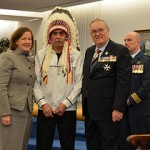
Treaty groups say Bill 22 could undermine their rights.
by Samantha Power
Two of Alberta's largest treaty groups were taken by surprise when a new consultation act was introduced into the legislature this past session and became law on May 27. "We were dismayed at the introduction," says Victor Horseman, the grand chief liaison with Treaty 8 of Bill 22: The Aboriginal Consultation Levy Act. "This doesn't show good faith."
The Confederacy of Treaty 6 First Nations called the introduction of the bill a "shock," and both Treaty 8 and Treaty 6 representatives called for its removal in order for it to go through a proper consultation process. But after five days of debate, it passed third reading on May 15 and received royal assent 12 days after that.
The bill was introduced as part of a broader change to a consultation process the government is developing. According to Horseman, putting the levy in place before the new consultation policy can be developed is troubling.
"[The bill] will ensure that the proper funding is in place to build capacity so First Nations can be fully engaged," Campbell said when introducing the bill. During debate in the legislature, Minister of Human Services Dave Hancock defended the levy, saying it merely put the onus on industry to pay for necessary consultation.
"What this act merely does is say that those people who are applying to do development with respect to lands which might affect the rights of a First Nation, either with respect to their reserve lands or traditional lands, need to be part of the consultation process, and because they're the ones that are proposing the development, they're the ones that ought to pay."
But according to a letter from the Confederacy of Treaty Six, which represents 18 First Nations groups under Treaty 6, the levy does not do much more than the current fees involved in impact benefit agreements.
The bill was introduced as part of a broader change to a consultation process the government is developing. According to Horseman, putting the levy in place before the new consultation policy can be developed is troubling.
"It gives the indication the consultation policy is already drafted," Horseman says.
Aboriginal groups were not the only ones calling for the removal of the bill over the few days it was in the legislature. The Wildrose, New Democrats and Liberals all voiced opposition over the bill's merits throughout the debate. NDP Aboriginal Relations critic Deron Bilous called for the removal of the bill from the legislature altogether so the government could go through a process of consultation with aboriginal groups.
"Notification is not consultation. The more that this PC government insists that this is the case, the more strained the relationship becomes with First Nations," Bilous said in a statement. "Only by rescinding Bill 22 and engaging in meaningful consultation can the government fulfil their obligations to First Nations."
“Notification is not consultation. The more that this PC government insists that this is the case, the more strained the relationship becomes with First Nations,” said NDP critic Deron Bilous.
Treaties 6 and 8 parties have both said the change may raise some constitutional questions. The new legislation has a requirement for bands to disclose financial information negotiated with private companies. Treaty 8 representatives argue that the bill creates a dangerous double standard biased against aboriginal groups.
"Any private company, First Nation owned or otherwise, is answerable only to their board of directors," Grand Chief Roland Twinn said of Treaty 8 in a statement. "This action could be taken as discriminatory."
One major question for the Confederacy of Treaty Six, which has stated they are looking into potential legal action, is the constitutional boundaries of the new legislation, which allows the provincial government to determine who is an aboriginal group.
One major question for the Confederacy of Treaty Six, which has stated they are looking into potential legal action, is the constitutional boundaries of the new legislation, which allows the provincial government to determine who is an aboriginal group.
The new legislation, which also aligns the consultation process with Alberta's new single energy regulator, is part of an overall redevelopment of the province's consultation procedure. As drafted, the new procedure would create a single office responsible for the type of consultation required when new industrial projects are proposed.
© Copyright 2013 Samantha Power, All rights Reserved. Written For: StraightGoods.ca

Sorry, the comment form is closed at this time.